On the street corners of Brooklyn, men and women from other countries wait for hours in the hope of finding a job. They’ll do anything. Up to and including putting up with the exploitative conditions that unscrupulous impresarios, knowing they don’t have ‘papers’, that they’re ‘illegal’, will subject them to. Division Ave grasps and reproduces this reality.
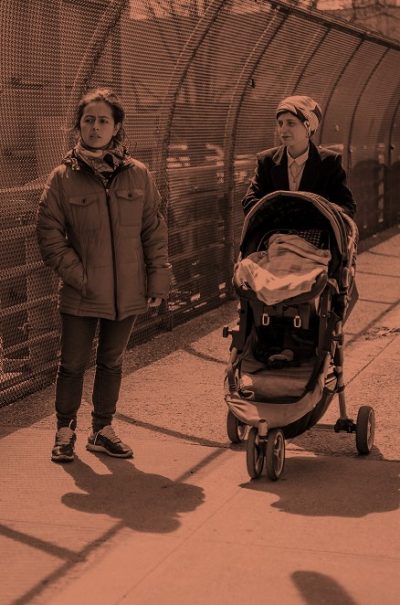 Nathan Raia
Nathan Raia
Fernanda, a Mexican immigrant, arrives in New York looking for work. She comes hoping to build a better future for her and her daughter and is determined to do any type of work in order to get there.
She could be any one of the thousands of migrants crossing the streets and cities of countries not their own, who each face daily fears and challenges.
Fernanda is a symbol of all Latina women who flee their country of origin to improve the lives of their family, children, parents, brothers and sisters. She works all day and all night to send money home. She represents the courage and power of all these women.
This is the story the short film Division Ave wanted to tell. A story about women, made by women. And to pull it off they launched a fundraising campaign that enabled them to raise US$ 15,600 thanks to the generosity of more than 200 donors. The rest was financed from their own savings, the female crew’s savings.
Of the 50 people involved in the project, 80% are women. What’s more, only five are from the United States, whilst the others are from places like Colombia, Israel, Mexico, Portugal, Peru, France and Italy.
Now they are focussing on bringing their short film to film festivals and currently they can say that it will be shown at the Washington DC International Film Festival (Filmfest DC), NYC Independent Film Festival, and the Bentonville Film Festival, among others. After the festival season, they will reconsider whether to make a feature-length film or a mini-series. For now, they’re just ideas. Lorena Rodriguez, a Colombian who is one of the producers of this short film that they hope to screen in the United States, talked to The Prisma about Division Ave.
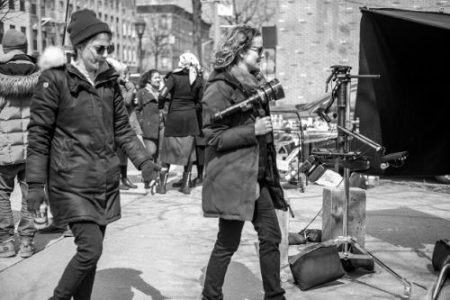
Who does Fernanda represent?
She represents Latina women, immigrants, who come to work in order to improve their family’s and children’s lives. Many sacrifice themselves, paying the price of living alone, far away from their families for many years. They work night and day to be able to send them money. Fernanda represents the courage and bravery of Latina women.
Why did you feel the need to tell this story?
Michal, our writer, knew about the situation going on on this Brooklyn corner from reading an article that talked about a Jewish man who had been arrested for stealing money from some women standing at this corner hoping to be picked up for “illegal”* work as domestic staff.
And, on the other hand, in the United States, there’s been a discussion about the “illegal” men who stop on street corners, but never about the women who do the same thing looking for work.
We want to make the situation more visible, raise awareness of it and raise our voices on behalf of the women working in domestic service.

What inspired you to make this short film?
Me and Michal know each other from the Lee Strasburg Institute school of performing arts where we graduated as actors.
We wanted to do something together and she told me about this corner in Brooklyn. So we decided to shoot a scene. Michal wrote it and we filmed it.
But when we saw the final product, we realised how powerful the story is because it portrays the feelings that many immigrants, in this case women, experience every day – that many of them experience living in a country with a different language and culture. So that’s when we decided to make the short film. There are very few stories of women in cinema and fewer that talk specifically about the reality for women immigrants in a cosmopolitan city like New York.
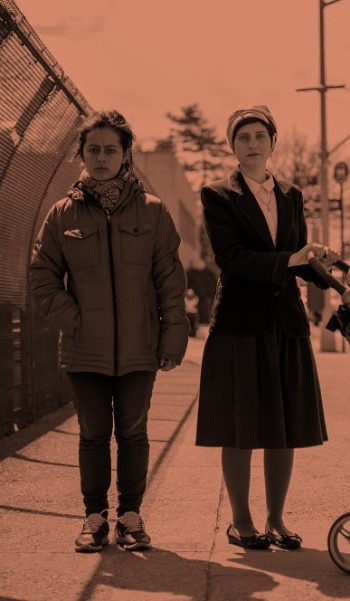 What were the main difficulties you had to battle in the production process?
What were the main difficulties you had to battle in the production process?
We’re young artists and for that reason, there were certain production arrangements we needed, that we just didn’t have.
For example, we weren’t insured to film on the New York streets. So we had to join forces with our associate producers who did have these kinds of permits.
We also needed to film in an apartment belonging to a real Hasidic Jewish family so that it would have exactly the right characteristics.
We spoke to many people without getting anywhere until we were introduced to a young Hasidic Jewish couple who liked the story and decided to help us. Their baby even has a role in the film.
Why did you decide to employ such a high number of women?
We’re women in the film industry and we know that the percentage of female involvement is not high, so from the beginning, we decided that the project would tell the story of women and would be made by women. We feel that taking action in this way helps to empower all of us in the industry.
The team is also multicultural. Did that come about naturally?
It was absolutely a natural process because what we wanted to find and work with women in the film industry, no matter what country they were from.
Was it useful having the support of a team composed of people from different walks of life?
Yes, it was a help. Thanks to this we were able to resolve production problems as they came along. For example, we had organised to film some scenes in a laundrette, but two days before shooting they came back and said no, we couldn’t, so we had to search far and wide for another location.
 Fortunately, our general producer, Leila Rusciani, had lived in Haiti and knew the culture, and in our search we found a laundrette with a Haitian owner. Leila intervened and we were able to shoot there.
Fortunately, our general producer, Leila Rusciani, had lived in Haiti and knew the culture, and in our search we found a laundrette with a Haitian owner. Leila intervened and we were able to shoot there.
Also, Malky, our art director, is Jewish from a Hasidic background, which helped resolve many detailed issues concerning the wardrobe and props.
Have any of the people involved in the project ever experienced the kind of slavery portrayed in the film?
No. We’re all immigrants living in New York, who have only experienced difficult situations springing from cultural differences, the language barrier or running out of money. To learn about the issues, we consulted Jewish and Latino people who have been exploited in this way.
Where do the crew members come from? Are they migrants or from the United States?
90% of the team comes from other countries, including Colombia, Israel, Peru, Mexico, France and Italy, among others. Only 10% were born in the USA.
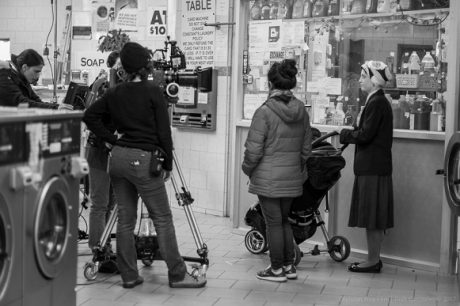
The film has been screened in the United States, a country with a president openly opposed to immigration…
The USA is a country of immigrants. New York is one of the most diverse cities in the world.
It’s the reality and it has to be talked about, disregarding the fact that the president is openly opposed.
Our art is the medium we use to speak of and draw attention to this reality.
What’s the reason for using three languages, adding the need for subtitles, when your audience is majority anglophone? Was this planned or did it arise naturally?
We wanted to make the story as real as possible. We felt that making it in English would strip some of the power away from the message we wanted to convey. For example, if we made Fernanda start speaking in fluent English, the power of the character would be reduced, because the reality is that there are many immigrants who cannot speak English and get by in the USA for years.
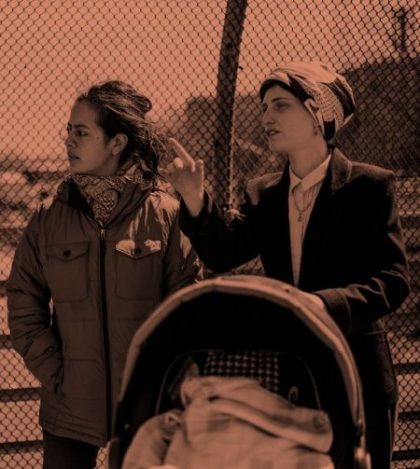 Do you think the film will have an impact?
Do you think the film will have an impact?
I think people will start to think about the immigrants working in domestic service and about their rights. Immigration is an important issue on a global level.
Is Division Ave the first film you’ve produced?
I’m an actor and visual artist. I have worked and still work on short film productions in Colombia.
As an actor, I work on Colombian film projects, and in the theatre, on stories that raise awareness about domestic violence.
Michal, the co-producer, has worked on many theatre productions in New York and on her YouTube channel she talks about the history of theatre. Nadav, our other co-producer, who wrote the film’s music, is releasing his first album, “Elk3”, in May.
* “Illegal”: Term used to describe immigrants lacking the correct documentation to allow them to live, work or study in a country other than their country of origin.
(Translated by Elizabeth Dann – Email: elizabethdann@blueyonder.co.uk) – Photos by Joshua Canizalez, provided by Division Ave












.jpg)












